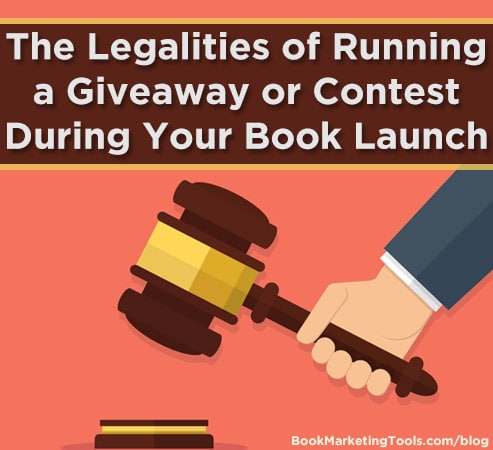Disclaimer: This post contains general information about the legalities of contests and giveaways. The information is not advice, and should not be treated as such. If you are concerned about a specific legal issue, please seek advice from a lawyer qualified in the relevant jurisdiction.
Thinking about running a giveaway or contest to help promote your book launch?
While these tactics are incredibly powerful, you should know that there are federal and state laws governing these types of promotion. There are also potential tax considerations.
Believe it or not, a surprisingly large portion of the contests and giveaways you see floating around online these days are actually classified as illegal lotteries. Non-compliance exposes the creators to potential liability, which can include fines and criminal prosecution. To avoid putting yourself in the same position, it’s important to understand the difference between contests, sweepstakes, and lotteries, as well as the three factors considered when determining if a giveaway is, in fact, an illegal lottery.
Contests: The winner is judged and chosen based on their submission or performance. Criteria can include things like the best photo, most likes, funniest video, etc.
Sweepstakes: The prize is awarded based on the luck of the draw. Entry is free, and the winner is chosen at random.
Lotteries: Like sweepstakes, the prize is awarded based on the luck of the draw. Unlike sweepstakes, entrants are required to buy their chance to win. Lotteries are highly regulated and prohibitively expensive to run. In most countries, they’re run exclusively by the government.
Definitions may vary from country to country, so it’s crucial to make sure you understand laws governing the countries in which you wish to host a giveaway. In Canada and some European countries, for example, most giveaways would be called contests since winners must be chosen based on specific criteria.
How can a sweepstake be misconstrued as an illegal lottery?
Well, there are three factors the law considers: 1) prize, 2) chance, and 3) consideration.
Prize: anything of value awarded to the winner(s)
Chance: the process of randomly selecting the winner(s)
Consideration: the entrant’s money, effort, or time
For sweepstakes to remain legal, there must be no consideration. In other words, entry should be free (no burden should be put on the entrant). Yes, that does mean giveaways requiring folks to complete certain actions could be viewed as illegal lotteries—even if the initial entry is free and the host provides additional ways to enter that are optional. It’s also important to note that sweepstakes may not have any means of entry that creates a greater or less than equal probability of winning.
Here’s the thing: the laws that govern this type of promotion haven’t yet caught up to the rapid speed at which technology is developing. We’re all navigating new territory here (especially when it comes to the definition of “consideration”), which is why you’ll see plenty of people implementing this tactic while not knowing they’re possibly using it illegally. It’s always best to err on the side of caution and always make sure that your sweepstakes have an option for free entry. You should also only allow entry to those who are 18 years and older, or you’ll have to deal with a whole new set of complex laws for minors.
What about taxes?
In terms of potential tax implications, you must report winnings with a value of $600 or more to the Internal Revenue Service if the winner is subject to U.S. taxes. A Form 1099 will be required, which means you’ll need to collect a name, address, and social security number from the winner. In cases where this is applicable, it’s crucial to make entrants aware of the prize value and that they will be responsible for any taxes that may result from winning. Since these matters are sensitive, you should maintain the highest level of professionalism when asking for and handling personal details.
In addition to what the law states regarding contests and giveaways, you’ll need to ensure you abide by the rules of any sites and services you’ll be using to create and promote your giveaway. Be sure to research the applicable rules thoroughly before deciding on a course of action for setting up your giveaway campaign. Facebook is particularly strict about how you run contests and giveaways on their site.
This information isn’t meant to scare you by any means. It’s simply meant to make you aware that there are legal implications involved and that implementing this tactic isn’t as simple as throwing up a blog post. So, now that you’re armed with a basic understanding of what constitutes a contest or sweepstake, go ahead and dive right into planning your campaign the right way.
Do you have a question about running a contest or giveaway? Drop it in the comment section and we’ll try our best to get you an answer. Be sure to subscribe for future posts on similar topics, as well as download our free book launch success checklist to make sure you’re implementing a strategic campaign the right way.


